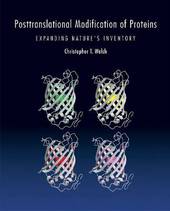
|
Posttranslational Modifications of Proteins
Hardback
Main Details
| Title |
Posttranslational Modifications of Proteins
|
| Authors and Contributors |
By (author) Christopher T Walsh
|
| Physical Properties |
|
| Category/Genre | Genetics (non-medical) |
|---|
| ISBN/Barcode |
9780974707730
|
| Classifications | Dewey:572.6 |
|---|
| Audience | |
|---|
|
Publishing Details |
| Publisher |
Macmillan Learning
|
| Imprint |
Roberts & Company Publishers
|
| Publication Date |
1 October 2005 |
| Publication Country |
United States
|
Description
The number of protein isoforms in proteomes can be two to three orders of magnitude higher than the number of genes in the genomes. This is in large part due to posttranslational modifications of proteins that provide covalent alterations to protein backbones and side chains that increase proteome complexities. Greater than 5% of the genes in the human genome encode enzymes that perform such modifications, including hundreds of protein kinases and opposing phosphatases, ubiquitinyl ligases, acetylases and deacetylases, methyl transferases and glycosyl transferases. The major classes of posttranslational modifications (PTM) are codified according to types of residues modified, underlying chemistry, PTM catalysts, and biological consequences. This is the first comprehensive treatment of this burgeoning area of proteome diversification.
Author Biography
Professor Walsh is currently the Hamilton Kuhn Professor of Biological Chemistry and Molecular Pharmacology at Harvard Medical School. He is one of the leading enzymologists in the world. He has published over 600 scientific articles and his book, Enzymatic Reaction Mechanisms (WH Freeman), has educated generations of enzymologists.
ReviewsChristopher Walsh, an acclaimed scientist, has written yet another outstanding book. It surveys the vast field of chemical modifications that proteins undergo in living cells. The book's depth of coverage and clarity of exposition will make it an indispensable text for both students and active researchers. -- Alexander Varshavsky Smits Professor of Cell Biology, California Institute of Technology Walsh effectively covers all of the major PTMs with a care for detail that is both admirable and captivating. The enzymes involved in generating PTMs are described with clarity and sufficient detail so that both novices and experts in this field are sure to learn much from this book. -- Benjamin F. Cravatt III The Skaggs Institute for Chemical Biology, The Scripps Research Institute Walsh has coalesced the dizzying array of posttranslational modifications into a small subset of reactions. It is written with a concise chemical logic and Walsh's typical flair that makes it a pleasure to read. -- Michael A. Marletta Professor of Chemistry, Professor of Biochemistry and Molecular Biology, University of California, Berkeley
|